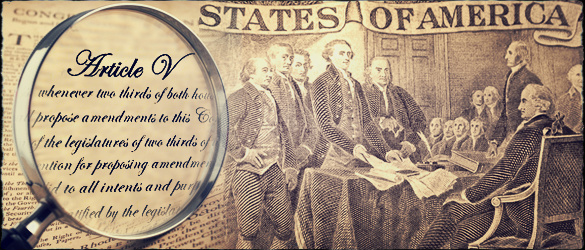Article V empowers states to limit the federal government and is the megaphone for the peoples’ voice. This is the final part of a how-to manual on limiting the federal government, skipping congress, and going straight to the Constitution.
We want to thank Nicole R. Fortune for this Op-Ed. If you have an Op-Ed or LTE
you want us to consider, please submit it to skip@ or steve@granitegrok.com.
Article V is the only states’ right to checks and balances on the federal government. It enables three-fourths of the states to hold a convention in which the states can propose amendments to the United States Constitution independent of the federal government.
Provided that either two-thirds of the several states or two-thirds of the convening states agree, the proposal(s) become amendments to the Constitution, which like any other amendment, binds the federal government. If the people do not like what Congress is doing or failing to do – Article V is the megaphone for their voice, but only if they use it.
States can opt-out of Article V. When the states call a convention, those states that do not convene foregoes the voice of its people. Not only do the non-convening states have no input regarding proposed amendments, but they also may not even have a vote on the proposals because Article V allows for ratification by two-thirds of the convening states.
Therefore, if only thirty states convene, twenty states could amend the Constitution, binding all fifty. While this supposition makes it appear that no state would opt-out, the fact is some do.
There are established groups that spread fear through the notion that a convention of the states could be used to seriously change or abolish the Constitution, encouraging states to opt-out of Article V. This fear has spread to New Hampshire.
As recently as 2020, our legislators attempted to opt-out of Article V with House Concurrent Resolution nine (HCR 9). The bill articulated this fear by stating, “such a convention may propose sweeping changes to the Constitution … thereby creating imminent peril to the well-established rights of citizens …” and “the Constitution may be amended many more times without the need to resort to constitutional convention…”.
Notwithstanding the quoted language, a dispute arose as to whether the language meant the state was merely withdrawing previous requests for a convention or withdrawing from Article V altogether. It was perhaps this lack of clarity that resulted in the failure to pass HCR 9.
However, even if abolishing the Constitution was a possibility, there is a greater danger in opting out of Article V than there is in having a convention. First, the states have not yet called a second convention, but should the need arise, they must be able to do so.
Second, opting out of a convention leaves the state with no voice and possibly no vote while providing a greater voice to those states convening and possibly requiring fewer votes to abolish the Constitution.
Third, if all states were to opt-out, then Congress alone would be the arbiter of the Constitution and the states could not call a convention to stop Congress.
Many people now believe that need has arisen. Congress has granted itself high salaries with every increasing raises, an exceptional retirement package, excluded itself from both social security and Obamacare while giving American tax dollars away to foreign countries without any real benefit to the American people.
Meanwhile, many people want term limits, pay limits, America first, and a balanced budget with no expectation that Congress will act to those ends.
That is the crux of it – the people do not need Congress. Article V is not only a way for states to amend the Constitution, it’s a way for states to limit the federal government, stop Congressional overreach and control their own governance.
Part I – Article V – Empowering States to Limit the Federal Government
Part II – Article V – Opting Out Means You Have No Voice
Part III – The Great Divide on Article V
